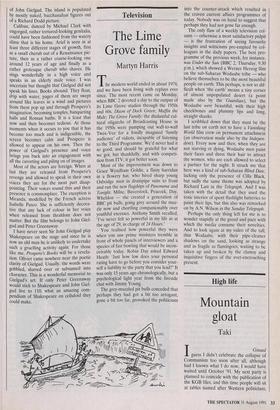Television
The Lime Grove family
Martyn Harris
The modern world ended in about 1974, and we have been living with replays ever since. The most recent came on Monday, when BBC 2 devoted a day to the output of its Lime Grove studios through the 1950s and 60s. Dixon of Dock Green; Muffin the Mule; The Grove Family: the disdainful cul- tural oligarchs of Broadcasting House in the 1950s were pumping out wall-to-wall Twee-Vee for a fondly imagined 'family audience' of vidiots, incapable of listening to the Third Programme. We'd never had it so good, and should be grateful for what we got, but thankfully, and with competi- tion from ITV, it got better soon.
Most of the improvement was down to Grace Wyndham Goldie, a flinty harridan in a flowery hat, who hired sharp young Oxbridge men in drainpipe suits to front and run the new flagships of Panorama and Tonight. Milne, Baverstock, Peacock, Day, Wheldon — she created a generation of BBC pit bulls, going grey around the muz- zle now and chortling companionably over youthful excesses. Anthony Smith recalled, `I've never felt so powerful in my life as at the age of 29, in charge of 24 Hours.'
You realised how powerful they were when you saw prime ministers tremble in front of whole panels of interviewers and a species of fast bowling that would be incon- ceivable today. Robin Day asked Edward Heath: 'Just how low does your personal rating have to go before you consider your- self a liability to the party that you lead?' It was only 15 years ago chronologically, but a psychological light year from the fireside chat with Jimmy Young.
The grey-muzzled pit bulls conceded that perhaps they had got a bit too arrogant, gone a bit too far, provoked the politicians into the counter-attack which resulted in the craven current affairs programmes of today. Nobody was on hand to suggest that perhaps they had not gone far enough.
The .only flaw of a weekly television col- umn — otherwise a most satisfactory pulpit — is the frustration of seeing favourite insights and witticisms pre-empted by col- leagues in the daily papers. The best pro- gramme of the previous week, for instance, was Under the Sun (BBC 2, Thursday, 9.30 p.m.), which showed a Werner Herzog film on the sub-Saharan Wodaabe tribe — who believe themselves to be the most beautiful people on earth. This perhaps, is not so dif- ficult when 'the earth' means a tiny corner of almost unpopulated desert (a point made also by the Guardian), but the Wodaabe were beautiful, with their high cheekbones and plummy lips and long, straight shanks.
I scribbled down that they must be the last tribe on earth not to have a Vanishing World film crew on permanent attachment (an observation made also by the Indepen- dent). Every now and then, when they are not starving or dying, Wodaabe men paint their faces and dress their hair to attract the women, who are each allowed to select a partner for the night. It struck me that here was a kind of sub-Saharan Blind Date, lacking only the, presence of Cilia Black, but sadly the same theme was adopted by Richard Last in the Telegraph. And I was taken with the detail that they used the toxic interior of spent flashlight batteries to paint their lips, but this also was remarked on by A.N. Wilson in the Sunday Telegraph.
Perhaps the only thing left for me is to wonder stupidly at the greed and pace with which the media consume their novelties. And to look again at my video of the tall, thin Wodaabe, with their pipe-cleaner shadows on the sand, looking as strange and as fragile as flamingoes, waiting to be taken up and broken by the clumsy and inquisitive fingers of the ever-encroaching present.










































 Previous page
Previous page